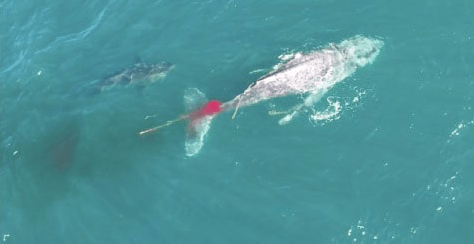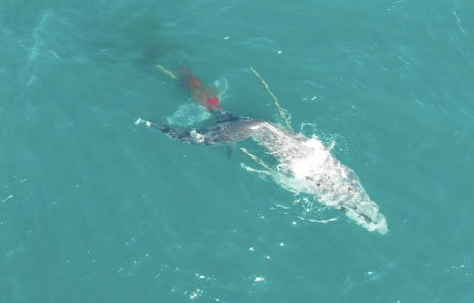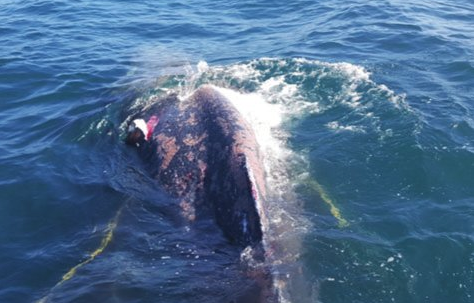First Observation of a Great-white Shark Killing a Live humpback Whale!
Sharks scavenging on the carcass of whales is nothing new, however to date, there has never been any observations of sharks actively hunting whales. For the first time ever, a great white shark, known as "Helen" has been recorded attacking and killing a live humpback whale.
A recent study published in the journal Marine & Freshwater Research described a great white shark ( Carcharodon carcharias ) attacking and killing a live humpback whale ( Megaptera novaeangliae ). The Oceans Research Institute’s was first alerted of an entangled humpback whale offshore at The Point, Mossel Bay, South Africa. The entangled humpback whale was emaciated and in poor body condition, with a heavy barnacle load and whale lice. Within an hour of one another, two great white sharks approached the whale, and each shark attacked it over a duration of 90 minutes.
The sharks were both estimated to be within 3.5–4 m in total length (TL) based on boat length comparisons and later confirmed via imaging software. Over the next 90 minutes, both white sharks approached the whale and each attacked it while still alive. The first shark positioned its initial attack from the rear of the whale, targeting the left flank behind the pectoral fin. However, although it bit the whale and a large amount of blood was released, it immediately let it go and swam away without removing any much blubber or muscle. It waited for about 42 minutes to allow the whale to lose blood and slow its swimming patterns before biting beneath the tailstock. But like the bite before, it let go and swam away without removing any meat or blubber. It was then that the second shark showed up and took this opportunity to do the same thing, scaring off the smaller shark. After these two back-to-back bites, the whale stayed very still at the surface until the second shark bumped its snout. The whale tried to dive, dipping its head under the water’s surface and arching its body but unable to move its tail. This new shark took advantage of that and bit the tail stock again, this time sharking its head, but released the whale once blood spurted out. That last bite sealed the fate of the whale, and it sank three minutes after that final bite. The second shark stayed until the whale sank, but both were not observed again in Mossel Bay over the following weeks.
This foraging behaviour displayed may be new-to-us, being the first evidence of the ‘bite and spit’ tactic, rarely described in non-pinniped-related white shark feeding events. Back in 1985, ichthyologist John McCosker proposed the so-called "bite and spit" hypothesis, where great white shark gives its prey an incapacitating bite and then releases it, waiting for the animal to bleed to death until it returns to feed. While this type of interaction between white sharks and humpback whales are likely to have existed long before it was recorded, and the live whale in this scenario was in injured and likely dying, but it does give us a glimpse into the rarely observed interactions between white sharks and live whales.
Reference:
Dines and Gennari (2020). First observations of white sharks ( Carcharodon carcharias ) attacking a live humpback whale ( Megaptera novaeangliae ). Marine and Freshwater Research, DOI: 10.1071/MF19291.
SHARE THIS ARTICLE
















